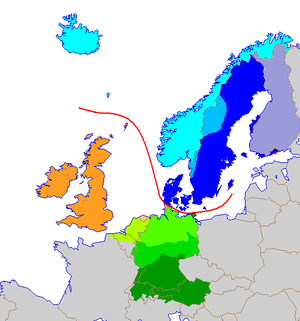This question is problematic in that it confuses German and Germanic. As others have pointed out, German is just of many Germanic languages. While German is the most conservative among the West-Germanic languages (the others being English, Dutch, Afrikaans, Yiddish and Frisian), Icelandic has a strong reputation as the most conservative North-Germanic language and is probably the most 'Germanic' of the Germanic languages overall.
I will try to formulate better questions that come close to the original intent. I can't give definitive answers, but I think I can provide some insights.
Which variant of English is most similar to German?
Since Middle English was quite similar to the German of the time, more conservative dialects should be closer to German. E.g., English is gradually shedding all its irregularities of verbs and nouns. Since this process is much slower in German, an irregular plural or past tense in English usually corresponds to one in German, but not vice versa. (E.g. sing/sang/sung corresponds to singen/sang/gesungen, mouse/mice to Maus/Mäuse.) A dialect of English that has preserved many of these irregularities will be closer to German in this respect. I would expect to find such varieties in remote areas such as islands or mountain regions that were settled from the UK a long time ago and that haven't had much influence from any other language.
We also need to consider modern influences. In this respect, we shouldn't count only strictly German influence, because any continental West Germanic language will have essentially the same effect for our purposes. The varieties of English that have had the greatest influence of this type are probably in the US due to the large number of German, Dutch and Yiddish speaking immigrants.
I'm a native German speaker who spent years in England but only a couple of weeks in North America. I would have expected my English to be closer to British English than American English, but when I first tested it here last year, the algorithm guessed some form of American English. (Apparently the algorithm has been refined since. When I just retested, this is what I got: Ebonics, England English or New Zealandish. Native language German, English or Dutch.) I think this gives additional support to the idea that American English should be closer to German than British English.
Which variant of English is most similar to Proto-Germanic?
For this question we should again be looking for a conservative dialect. But this time we should include the other branch of the Germanic languages, i.e. North Germanic. Skandinavian languages have had a greater influence in the north of England and in Scotland.
Which variant of English is intelligible to the largest number of speakers of other modern Germanic languages?
There is very little 'natural' mutual intelligibility except to a very limited degree with Frisian (a small family of dialects spoken in the north of the Netherlands and of Germany) and to an even more limited degree with Dutch. Therefore the answer is rather boring: Any sufficiently standard variety of English will do the job equally well, but any variety with non-standard phonetics will be harder because those are not taught in English classes.
Speakers of which variant of English can understand the largest number of speakers of other modern Germanic languages?
I just don't know. I would be very interested if anyone had some insight to contribute. Maybe speakers of conservative southern English dialects are best at understanding Frisian and some Dutch? But maybe some speakers of northern dialects can also understand some Norwegian or Swedish? (I am guessing that Danish is harder due to the extreme phonetic changes it has undergone. But if these are largely parallel to sound changes in English, Danish should perhaps be first on the list.)

